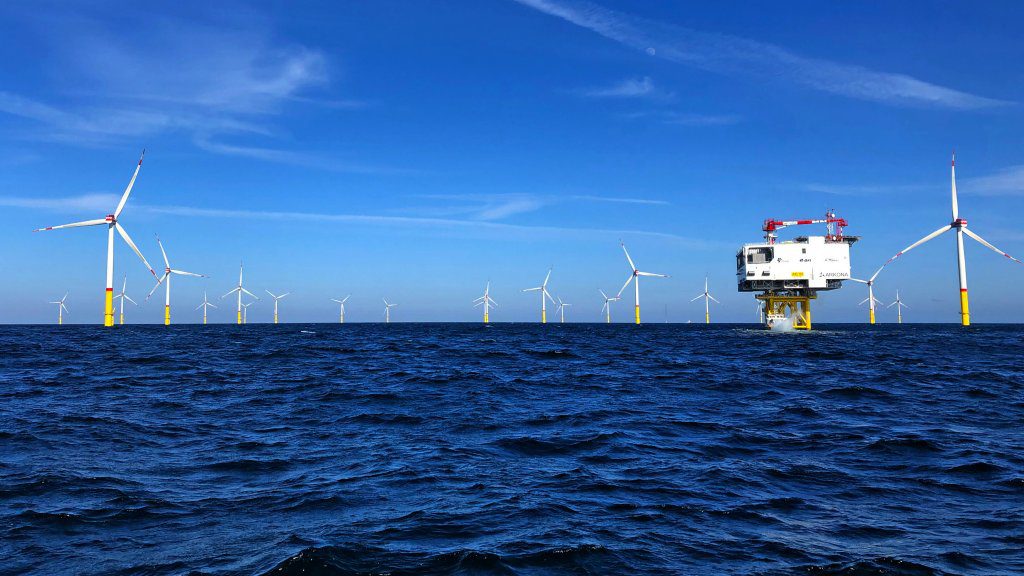The Arkona offshore wind farm in the Baltic Sea near Mukran on the German island of Rügen. Photo: Eskil Eriksen / Equinor ASA
By Brian Parkin and William Wilkes (Bloomberg) — Angela Merkel will leave Brexit worries by the shoreline as she cuts the opening ribbon on a giant wind farm out in the Baltic Sea, a move that will do little to gloss over her tarnished reputation as Germany’s climate chancellor.
The Arkona wind park, a joint venture of utility EON SE and Norway’s oil and gas giant Equinor ASA, is in her constituency. Built in just three months off the coast of Ruegen island, the 60-turbine site can generate enough power for 400,000 homes and is the largest wind farm in the Baltic. It’s a home turf celebration for Merkel, who usually can’t find the time to open new green projects.
The German leader last year turned down invitations to open Siemens Gamesa Renewable Energy SA’s turbine factory in Cuxhaven on the North Sea and Iberdrola SA’s Wikinger Baltic offshore park, also in her backyard. Yet climate woes are stacking up in Merkel’s last two years as chancellor.
Cutting the ribbon for the Arkona park “underlines just how important it is for us to expand renewable energy,” Merkel said in her weekly podcast Saturday. Her government is doubling down on cutting emissions after resolving this year to exit coal power, she said. “It’s clear we’re facing enormous efforts ahead.”
Emissions have barely dropped since Merkel took office in 2005, even with clean power now generating about 40 percent of electricity. Subsidies paid by power consumers to support wind, solar and biomass have made the nation’s electricity bills the highest in the EU-28 after Denmark. Germany is the bloc’s biggest greenhouse gas emitter.
As temperatures soared last summer to a national record, polls showed climate returned to voters’ biggest worries. The Rhine, Europe’s busiest river artery, sank to near-record lows, disrupting oil and coal transport. Withered corn and wheat fields forced Germany to import grains for the first time in 24 years.
That’s all while Germany let its climate goals slip and Merkel’s government blocks ambitious transport emission cuts at European level, moves that have scotched her claims to being the “climate chancellor,” according to Claudia Kemfert who follows energy policy at the DIW research institute in Berlin.
“Germany has gone from being a climate pioneer to a laggard,” Kemfert said.
Merkel, an eastern German protege of former Chancellor Helmut Kohl, was the nation’s Environment Minister from 1994 to 1998, a tenure marked by revived protests against nuclear energy.
The experience may have stiffened her resolve to wind down nuclear power in the wake of the Fukushima catastrophe in 2011 and let clean power subsidies run virtually unchecked this decade. Her administration seeks a 65 percent share for green power in the nation’s energy mix by 2030.
Merkel and her newly-appointed “ climate Cabinet” of ministers may be faced with the biggest policy decision since Fukushima, giving a further clue to an intensified focus on cutting emissions.
Germany must mull how to put a price on carbon output in sectors outside the EU’s Emissions Trading Scheme, including the “sleeping giant” of emissions from buildings and from transportation, she said in her podcast.
“By the end of the year we’ll need to decide whether we approach CO2 sector by sector or focus on a price mechanism across the board,” she said.
© 2019 Bloomberg L.P

 Join The Club
Join The Club











